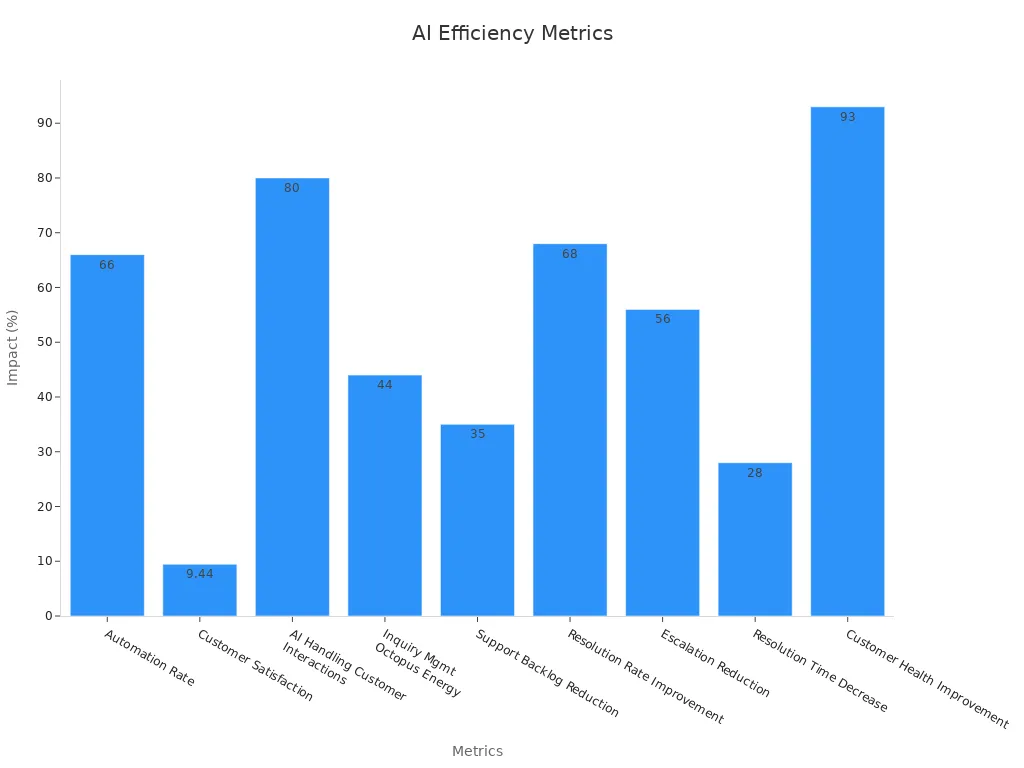AI-Generated FAQs that cut support tickets

AI-Generated FAQs help lower support ticket numbers. They give customers fast and correct answers. You can stop agents from getting the same questions again and again. This saves time and money for your team. 81% of customers want to fix problems by themselves. Companies like Saleo saw over 50% fewer repeat questions after using a smart FAQ system. This way, customers are happier and your work gets easier.
Key Takeaways
AI-Generated FAQs give fast answers to common questions. This helps lower support tickets and saves your team time.
The AI studies old support tickets to give correct answers. It keeps learning and gets better as time goes on.
Connecting AI FAQs to chatbots and support tools helps things run faster. This lets agents spend more time on hard problems.
Update and check your AI FAQs often with customer feedback and data. This keeps answers useful and up-to-date.
Good accuracy checks, clear rules for moving issues up, and privacy protections help build trust. They also make support work smoothly.
How It Works

AI-Generated FAQs
AI-Generated FAQs help answer customer questions fast and right. The system looks at your old support tickets and knowledge base articles. It finds out what questions people ask the most. LinkedIn used a special method with a knowledge graph from old tickets. This made answers more correct by over 77%. It also made solving problems almost 29% faster. When AI checks your ticket history, it learns to group and fix similar issues. Studies show AI trained on old tickets can sort tickets 28% better. This makes your FAQs more useful for your customers.
You can see real results from companies using AI-Generated FAQs. Here are some examples:
Company | Key Objectives | Results |
|---|---|---|
Suitor | Automate responses to common questions | Automated 85% of service; response time dropped to 6-15 seconds; only 24% sent to agents |
Procosmet | Improve order management and customer satisfaction | Sales up 23%; customer rating rose from 3.8 to 4.7/5 |
Endeksa | Manage high call volume and boost lead generation | Waiting times down 59%; leads up 138%; chatbot helpfulness at 88% |
ING | Provide scalable, fast, and empathetic AI chatbots for banking customers | 24/7 support; improved satisfaction and loyalty |
Motel Rocks | Enable self-service and assist agents | 43% ticket deflection; 50% fewer tickets; 9.44% higher satisfaction |
Camping World | Handle 24/7 calls and reduce agent strain | 40% more engagement; 33-second shorter wait; 33% more agent efficiency |
Telstra | Speed up agent responses with AI summaries | 20% fewer follow-ups; 84% agents saw positive impact; 90% more effective agents |
Automation Process
You can link AI-Generated FAQs to your chatbots and support tools. The system uses natural language processing to understand questions, even if words are different. The AI keeps learning from new tickets and feedback. This helps your FAQs stay current.
You can see how much time users spend on FAQ modules and quizzes.
You can get feedback right after customers use the FAQs and after they fix their problems.
The system does tasks like sending notifications and tracking completion, so your data is always fresh.
Data analytics help you find gaps in FAQ use and make content better.
You can connect FAQ use to real business results, like more feature use or fewer problems.
Some platforms, like MTM, collect feedback and update dashboards right away. They use AI to find important topics and check how customers feel. This helps your FAQs keep improving and match your business goals.
FAQ Types
Common Questions
Customers often ask the same things many times. AI-Generated FAQs answer these questions fast and correctly. For example, people might ask, “How do I reset my password?” or “Where can I track my order?” The AI looks at your support history and finds these common questions. It then makes clear answers for them. This helps customers fix problems by themselves. Your team gets fewer tickets to handle. Many companies say customers get answers in just seconds. Fast replies help customers trust you. Your support team can then work on harder problems.
Tip: Check your support logs every month. You can find new common questions and update your FAQs to help more people.
Troubleshooting
Technical problems can make customers upset. AI-Generated FAQs give step-by-step help for issues like “Why won’t my device connect to Wi-Fi?” or “How do I update my app?” The AI learns from old tickets and gives the best answers right away.
Here is how AI helps with troubleshooting:
Metric / Benefit | Impact / Improvement | Business Value / Explanation |
|---|---|---|
Automation Rate | AI handles many routine questions, making work faster | |
Customer Satisfaction | 9.44% increase | Customers are happier with quick, personal answers |
AI Handling Customer Interactions | Over 80% | AI manages most chats with good quality and care |
Inquiry Management (Octopus Energy) | 44% of inquiries handled by AI | Human agents can focus on harder problems |
Support Backlog Reduction | 35% decrease in ticket volume | Fewer tickets means faster help for everyone |
Resolution Rate Improvement | 68% increase | More problems get solved with AI tools |
Escalation Reduction | 56% decrease | Less need to send issues to higher support |
Resolution Time Decrease | 28% reduction | Problems get fixed faster, so customers are happier |
Customer Health Improvement | 93% better retention (VIP) | More customers stay loyal and keep coming back |
Cost Efficiency (Chatbots) | $0.50-$0.70 per interaction vs $19.50/hr human cost | Using AI saves a lot of money and helps more people |

AI can answer most troubleshooting questions. This means fewer tickets and happier customers.
Account & Policy
Many people ask about account access, billing, or company rules. AI-Generated FAQs help answer, “How do I update my payment method?” or “What is your refund policy?” fast and clearly. AI helps by showing the right information and documents. This keeps your answers the same every time. It also lowers legal risks. The AI does not decide alone. Your team checks and approves any policy changes or important answers. This keeps your company safe and builds trust with customers.
Impact on Support Tickets

Ticket Deflection
AI-Generated FAQs can make support tickets go down a lot. Many companies say customers find answers by themselves. This means they do not need to talk to your team. For example, one company saw a 60% drop in tickets. Out of 500 customers, 300 fixed their problems with AI-powered FAQs or chatbots. Only 200 needed help from a real person. AI chatbots look at your knowledge base and give exact answers. Generative answering tools give clear replies right away. You can watch these results as they happen and see how many people use self-service. If someone asks about shipping costs, the chatbot gives the answer. The customer does not make a ticket. This direct help keeps ticket numbers low. Your team can then work on harder problems.
Efficiency Gains
You get more than just fewer tickets. Your support team works faster and better. AI-Generated FAQs let you handle more requests without hiring more people. You can automate answers to easy questions. This means agents spend less time on simple things. Your team gets more done. You also save money because AI costs less than humans. Your team can focus on special cases that need a real person. You can check these gains by counting how many tickets your team solves each day and how fast they reply. With AI, wait times are shorter and customers get help faster.
Note: Real-time numbers help you see patterns and make your self-service tools better. You can change your FAQs based on what customers ask most.
Customer Experience
Customers notice the change right away. They get answers fast and do not have to wait for an agent. The Customer Satisfaction Score (CSAT) shows how happy customers are after using your support. Many companies see their CSAT scores double after adding AI. You can measure CSAT from 1 to 5. Scores of 4 or 5 mean customers are happy. When you check CSAT after each chat, you see what works best.
Here are some ways AI makes customer experience better:
You give instant answers, so customers do not wait.
You keep answers the same everywhere, so customers trust you.
AI learns from every chat, so answers get better over time.
If a problem is too hard, AI sends it to a real person with all the details, so customers do not have to repeat themselves.
AI can tell how customers feel and answer in a kind way.
Measurement/Strategy | Description | Impact on Customer Satisfaction |
|---|---|---|
AI-powered chatbots help all day and night in many languages. | Makes it easier for customers to get help anytime. | |
Automated Post-Call Follow-up | AI sends surveys and collects feedback right after chats. | Makes sure customers feel heard and problems get fixed. |
Quality Assurance (QA) Coverage | AI checks every chat for rules and correct answers. | Finds trends and helps agents do better, making customers happy. |
Accurate Information Delivery | AI checks databases right away to give agents the latest info. | Builds trust with customers by giving correct answers. |
Predictive Analytics & Routing | AI guesses how many calls will come and sends customers to the right agent fast. | Cuts wait times and helps solve problems faster. |
You can see that AI-Generated FAQs do more than just lower tickets. They help you give better, faster, and more trusted support.
Implementation Guide
Identify Queries
First, find out what questions customers ask the most. Use machine learning and natural language processing to look at support tickets and chat logs. Cluster analysis helps you put similar questions together. Sentiment analysis shows which problems make customers upset. Platforms like Quadratic AI make these steps easier by using different data tools. When you know the main questions, you can build a strong base for your AI-Generated FAQs.
Tip: Check your support data every month. This keeps your FAQ list up to date.
Train AI
Teach your AI with real questions and answers from support. Use labeled data and golden examples to show the system what good answers look like. Track important numbers like accuracy, precision, recall, and F1 score. These numbers show how well your AI understands and solves problems. Watch response time and resolution rate to see if things get better after training. Customer satisfaction and sentiment scores help you see if answers are good.
Metric | What It Shows |
|---|---|
Accuracy | Correct answers given |
Precision | Few false positives |
Recall | Finds all real issues |
F1 Score | Balance of precision/recall |
Response Time | Speed of answers |
Resolution Rate | Problems solved |
Integrate Systems
Connect your AI-Generated FAQs to your website, chatbots, and help desk. Use APIs to link the AI with your support tools. Set up dashboards to watch how people use the system and how well it works. Automated scoring systems, like BLEU or ROUGE, help you check if answers are good. Add human review for hard or creative questions. Use A/B testing to compare different AI setups and pick the best one.
Note: Keep your team involved. Human feedback helps the AI get better.
Optimize
Keep making your system better over time. Look at performance dashboards and user feedback often. Find patterns in missed questions or slow answers. Make small changes, then test and see what happens. Companies like Hitachi use this way to get more work done and make things better. Regular reviews and updates keep your AI-Generated FAQs correct and helpful. Always check for safety, privacy, and fairness in your answers.
Watch how many people use the system.
Get feedback from staff and customers.
Change your review rules as your business grows.
Addressing Concerns
Accuracy
You want your AI-generated FAQs to always give the right answers. To build trust, you need strong checks and ways to measure if answers are correct. Many companies watch answers in real time and check facts often. They also review answers to make sure they are right. You can set up systems that score answers for truth and track how often the AI is correct. Some platforms check the system every day and review accuracy each week to find mistakes early.
Use scoring and source tracking to check if answers are true.
Set clear rules for how accurate answers must be.
Watch for mistakes with alerts and regular checks.
Have people review hard or new topics.
Let the AI say it is unsure or ask for more details if needed.
Updating often and having people check answers helps your AI stay smart and trusted.
Escalation
Some problems are too hard for simple answers. You need clear rules for when the AI should send a question to a person. This stops customers from getting stuck and helps your team fix hard problems fast. AI uses smart steps to find tough questions and send them to the right person. You can see how well this works by checking if customers are happy, how fast problems get fixed, and how often issues get sent to people.
Aspect | Description |
|---|---|
Escalation Protocols | Make clear rules for when AI should send to a person. |
Performance Measures | Check if customers are happy, how fast problems are fixed, and how often issues are sent up. |
Feedback Mechanisms | Get feedback right away to help both AI and people do better. |
AI Technologies | Use machine learning and language tools to spot and send hard problems to people. |
Outcome Assurance | Make sure hard problems get solved and customers stay happy. |
A good plan for sending hard problems to people keeps support smooth and customers happy.
Privacy
You must keep customer data safe at all times. Top companies follow strict privacy laws like GDPR, CCPA, and the EU AI Act. These rules say you must use tools to sort data, get consent, and watch systems in real time. Many companies now use AI to find risks, manage consent, and keep records safe. Regular checks and clear jobs help everyone know how to keep data safe.
Use tools to keep data private and follow the rules.
Watch systems all the time to find problems early.
Make clear rules and jobs for handling data.
Check for privacy risks often with audits.
Tell customers how you use their data.
Keeping data private builds trust and keeps your business safe from legal problems.
You can reduce support tickets and boost efficiency by using smart FAQ solutions. Start by finding common questions, training your AI, and connecting it to your support tools. Review and improve your system often. When you invest in these tools, you help your team and your customers.
Ready to see results? Try a pilot program and watch your support improve.
FAQ
How do AI-generated FAQs know what customers want to ask?
AI reviews your past support tickets and chat logs. It finds patterns in the questions people ask most. You get answers that match real customer needs, not just guesses.
Can you update AI-generated FAQs as your business changes?
Yes. You can add new questions or edit answers anytime. The AI learns from new data and feedback. You keep your FAQs fresh and relevant.
What if the AI gives a wrong answer?
You can set up alerts for mistakes. Your team reviews flagged answers and corrects them. AI improves with every update.
Tip: Always check feedback to catch errors early.
Will AI-generated FAQs work with your current support tools?
Most AI FAQ systems connect easily to chatbots, help desks, and websites. You use APIs or plugins for fast integration.
Check with your vendor for supported platforms.
Is customer data safe with AI-generated FAQs?
You control how the system handles data. Leading platforms follow strict privacy laws like GDPR and CCPA.
Security Feature | Benefit |
|---|---|
Data Encryption | Keeps info private |
Access Controls | Limits who sees data |
See Also
Writesonic And QuickCreator Battle For Content Creation Supremacy
Step-By-Step Guide To QuickCreator’s New Efficient Content Tools
Complete Guide To Achieving SEO Success Using Perplexity AI
Definitive Guide To Winning At SaaS Content Marketing Strategies
Customizing Blog Content To Suit Startup Audience Preferences

